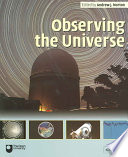

Most ebook files are in PDF format, so you can easily read them using various software such as Foxit Reader or directly on the Google Chrome browser.
Some ebook files are released by publishers in other formats such as .awz, .mobi, .epub, .fb2, etc. You may need to install specific software to read these formats on mobile/PC, such as Calibre.
Please read the tutorial at this link: https://ebookbell.com/faq
We offer FREE conversion to the popular formats you request; however, this may take some time. Therefore, right after payment, please email us, and we will try to provide the service as quickly as possible.
For some exceptional file formats or broken links (if any), please refrain from opening any disputes. Instead, email us first, and we will try to assist within a maximum of 6 hours.
EbookBell Team

4.7
46 reviewsObserving the Universe:
A Guide to Observational Astronomy and Planetary Science
Compiled by a team of experts from The Open University, this textbook introduces a range of techniques and skills designed for students who are undertaking observational work in astronomy and planetary science.
Part I introduces modern tools and techniques, starting with a discussion of the night sky and an introduction to positional astronomy. This is followed by a description of telescopes, spectrographs and astronomical detectors. Several chapters are devoted to a discussion of CCD data-reduction techniques, and how to deal with photometric and spectroscopic data. The use of petrographic microscopes for the analysis of extraterrestrial mineral samples is introduced, and some guidance on the interpretation of images of planetary surfaces is given.
Part II focuses on the development of skills that are of relevance to astronomy and planetary science projects. There are chapters on teamwork, preparing for practical work and keeping records. This is followed by a review of how to deal with experimental uncertainties, notes on analysing experimental data, and guidelines on making use of graphs and computers. The book concludes with a discussion of how best to communicate the results of scientific investigations.
Written in an accessible style that avoids complex mathematics, and illustrated in colour throughout, this book is suitable for self-study. It contains numerous helpful learning features such as chapter summaries, student exercises with full solutions, and a glossary of terms.
Observing the Universe is directed at students who are about to engage in observational optical astronomy and planetary science, but who have had little exposure to this discipline before. The book will also appeal to amateur astronomers, to beginners as well as to experienced backyard observers, who would like to go beyond the passion of pure observing into the realm of scientific measurements